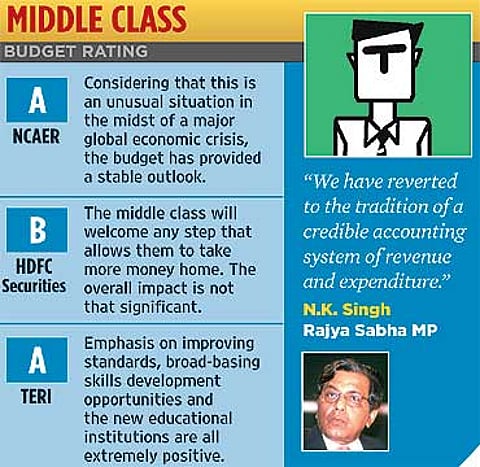Paper Tiger Economics
Are reforms really on hold or was it just 'poor packaging'? Has the era of 'big policy in a suitcase' ended? Are we back to the '80s? Pranab Mukherjee's 'holding budget' leaves its flanks open.
What was announced in Budget ’09
- Convergence of many rural programmes under NREGS: Could create more durable assets in rural India
- Plan to make India slum-free in three years: Could encourage land-grabbing
- Shift to nutrient-based fertiliser subsidy with farmers as direct beneficiaries: Roadmap will take time
- Issue unique identity cards, particularly to the BPL segment: To help improve delivery of schemes
- ALSO: Rollout of goods and services tax from April 2010
- Legal provision to help poor access subsidised foodgrains
- Study on feasibility of freeing transport fuel pricing
- Dilution of government stake in some PSUs to 51%
- Uniform dilution of promoters’ stake in listed companies
- Recapitalise PSU banks to improve financial health
- Policy initiatives to attract more foreign investment
- Power sector reforms guided by integrated energy policy
- Address agriculture/environment concerns through eight national missions
- Independent monitoring and grievance redressal mechanism at district level.
- Revamp nutrition delivery programme with more role for panchayats
- Reforms to improve delivery of public services
- Revamping banks, POs for financial inclusion, outreach
- Education reforms for more inclusion and excellence
- Establish regulator for pension sector
***

While this is a thanksgiving, what’s missing is a clear signal that reforms—a roadmap for fiscal prudence, administrative reforms, steps to attract foreign capital waiting to come in, increasing public shareholding in PSUs, opening up new sectors to competition—will take place in a hurry. The argument that the effect is all due to poor "packaging" from a veteran finance minister just doesn’t wash. There were, after all, strong reasons for high "expectations", reactions from the markets are always "over the top" and the media has been "hyping" the budget for decades now. So why blame the messenger?



Similarly, the finance minister’s proposal to widen the tax net by extending service tax to goods carried by railways, coastal cargo and inland waterways, and the move to bring all small businesses with up to Rs 40 lakh turnover into the tax net are seen by experts as positive steps to improve revenues without ruffling political allies. And the move to apply service tax on legal consulting firms is a long-overdue move to bring part of an entrenched lobby into the tax net.

While expecting more clarity on reforms—particularly disinvestments—during the course of the year, NIPFP director M. Govinda Rao finds this budget more transparent than the previous ones of the UPA government. Defending what he described as "a holding budget" that is taking forward government programmes, Rao says, "When the economy is not doing well, it is not the time for big reforms." This mirrors the view of reformers in the Congress that an uncertain economic environment is not the best time to push for major reforms.


The lack of elaboration on the reforms agenda is clearly due to political compulsions, feels Gaurang Shah, head, Kotak Life Insurance. "I don’t agree that the FM hasn’t mentioned reforms and disinvestment. If you look at the statement about nationalised banks, insurance companies and infusion of capital, then you could consider that he is indirectly saying that while he retains 51 per cent, the balance 49 per cent could be open for discussion." (By and large, bankers and those in the insurance sector refused to get perturbed by Pranab’s reference to Indira Gandhi’s move to nationalise banks 40 years ago.)

Looking beyond the budget documents, the corporate sector is looking at the brighter side of life. There have been some positive indicators recently—the government has hiked auto fuel prices, Infosys honcho Nandan Nilekani is spearheading the ambitious Unique Identification Card project. Seen along with the change of guard in the ministries of surface transport, education and health—as well as the promise of the stiff 100-day agenda set by the PM—they spy a glimmer of growth along with hope. It’s been in short supply lately.
By Sunit Arora and Lola Nayar with Arindam Mukherjee, Arti Sharma and Pragya Singh
Tags